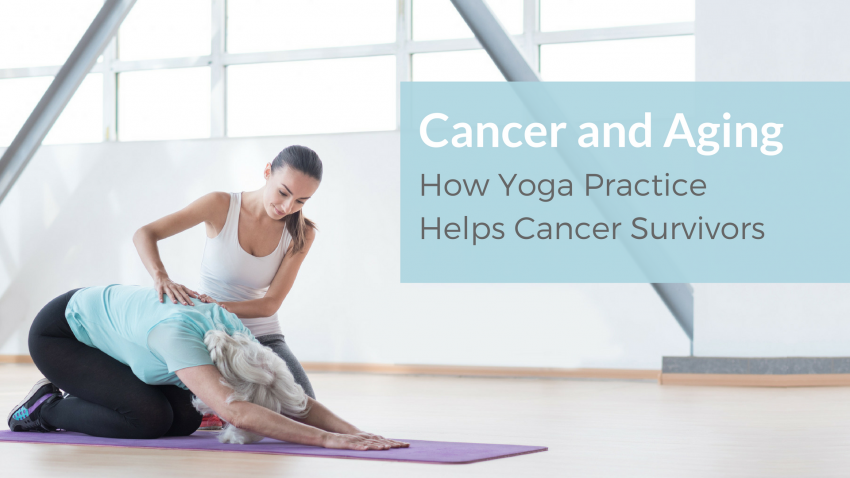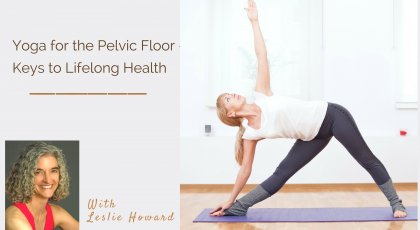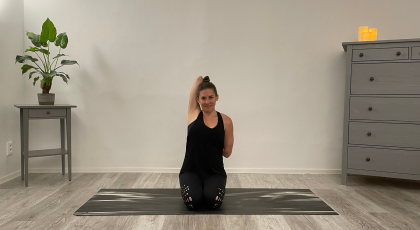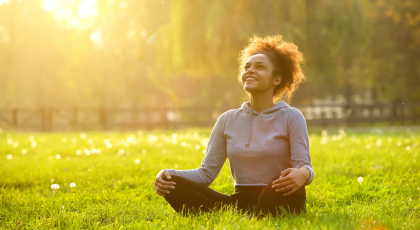View basket (0 items $0.00)

Cancer and Aging: The Role of Yoga and Healthy LIfestyle in Cancer Prevention
Is there a link between cancer and aging? If so, what role can yoga play? Well, there is now irrefutable evidence that age is the single greatest risk factor for cancer.
Nearly 70% of people who have cancer are 65 years or older and nearly 60% of cancer survivors are in their 60s. Interestingly, a subset of the biological mechanisms that regulate the aging process is also involved in the development of cancer. Since the population of adults reaching older ages is increasing rapidly, the total number of new cancer cases will also increase if current incidence rates remain unchanged. By 2030, an estimated 70% of all cancers will occur among adults aged 65 years or older.
The Relationship Between Cancer Treatment and Aging
Being older can also affect cancer treatment and management. The issue becomes more complicated if the aged individual has another existing disease or disability (co-morbidity). Studies show that doctors restrict older adults from receiving every treatment that is available due to fears of side effects because of the age factor.
Thus, older adults have fewer treatment options for cancer than younger people. And while older individuals deal with the mental and emotional challenges of cancer better than younger people, they have other concerns about how cancer treatment could affect their ability to live alone without support, how radiation therapy can compromise other organ function, or how chemotherapy could affect their memory.
Although aging itself cannot be reversed, the age-associated factors that contribute to cancer risk can definitely be prevented, reversed, or delayed. For example, it has been shown that when some of the environmental factors that influence the aging process are controlled, this can also delay or completely block the onset of cancer. Similarly, suitable dietary intervention or drugs that possess anti-aging activity are able to delay or prevent cancer.
Current research suggests that for most adults who maintain a healthy lifestyle, cancer is not an inevitable consequence of growing older. In contrast, the prevention or at least the delay of cancer can be viewed as an effective strategy for achieving a healthy, long life.
Several of the research studies point to midlife as the most crucial period in determining an individual’s longevity and chances of getting cancer. Midlife is also the time when some well-recognized risk factors for cancer begin to have an impact on an individual’s lifespan. The occurrence of chronic conditions such as obesity and diabetes tends to increase during midlife, and have been associated with increased cancer risk and reduced lifespan.
Thus, the promotion of good lifestyle practices during midlife is a promising strategy to prevent or delay cancer incidence and to achieve a productive health span. Strategies include but are not limited to diet intervention, supplements, nutraceuticals, stress management, and exercise.
How Yoga Practice Can Help Cancer Survivors
One noteworthy intervention that is attracting a lot of attention among researchers and health practitioners alike is yoga! Several studies now show that a yoga regimen for adults at midlife or individuals undergoing cancer treatment not only improves psychological outcome and physical symptoms as well, but also in that process extends the life span of those individuals. Yoga has been shown to improve diverse outcomes among cancer survivors by reducing adverse symptoms and mood disorders, and by enhancing function.
Researchers are amazed at yoga’s potential to simultaneously address multiple areas, including social, physical, and psycho-emotional, and simultaneously enhance strength, coordination, balance, posture, and flexibility in cancer victims.
Studies have shown that a structured yoga practice during cancer treatment can reduce stress and anxiety, and can radically improve symptoms such as pain and fatigue by reducing heart rate and blood pressure and easing the lung’s respiratory function. Additionally, yoga asana—no matter how gentle the movements—along with meditation allows the body to release endorphins that alleviates depression, anxiety, and insomnia to help patients become emotionally strong during the cancer treatment.
All these research studies are revealing what cancer centers and yogic practitioners have long known: cancer survivors can benefit from yoga! So, if you have a loved one with cancer, encourage that individual to have a yoga practice that can serve as a way to help deal with the physical, mental, and emotional stresses. The calming effects of yoga and meditation provide a physically and emotionally beneficial activity which can be life affirming to a cancer patient, survivor, or even a caregiver to someone who is fighting the battle with cancer.
Plus, it could add years to their life.
Reprinted with permission from yogaforhealthyaging.blogspot.com.
Want more on Yoga for Healthy Aging from contributor Ram Rao, Phd. & YogaUOnline? Read this study-based article - How Yoga Helps You Stay Young Longer: Study Shows Stress Relief Helps Reduce Inflammation.
Do you want to learn more about yoga's healing benefits and cancer? Study with YogaUOnline and Tari Prinster - Introduction to Yoga for Cancer: Tapping into the Body's Inherent Healing Wisdom.
Ram Rao, Ph.D. With a doctorate in Neuroscience, Ram presently serves as a Research Associate Professor at the Buck Institute for Research on Aging. He focuses on various aspects of age associated neurodegenerative diseases with emphasis on Alzheimer’s disease. In addition, Ram completed the academic training at the California College of Ayurveda (CCA) and received his certification as Clinical Ayurvedic Specialist. He has been a faculty of the California College of Ayurveda and teaches in their Nevada City location. Ram is also a dedicated Hatha yoga practitioner and is a Registered Yoga Teacher from Yoga Alliance USA. In his spare time he offers consultations in YAMP techniques (Yoga, Ayurveda, Meditation & Pranayama). Ram has published several articles in major Yoga/Ayurveda magazines and has been a featured speaker in several national and international meetings and symposia. He is a member of the National Ayurvedic Medical Association (NAMA) and is on the Research Board of the Association of Ayurvedic Professionals of North America (AAPNA).
Featured Courses









